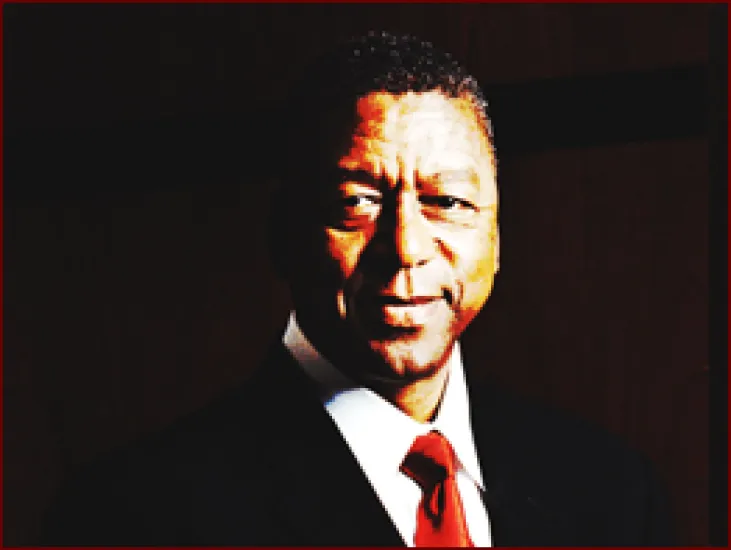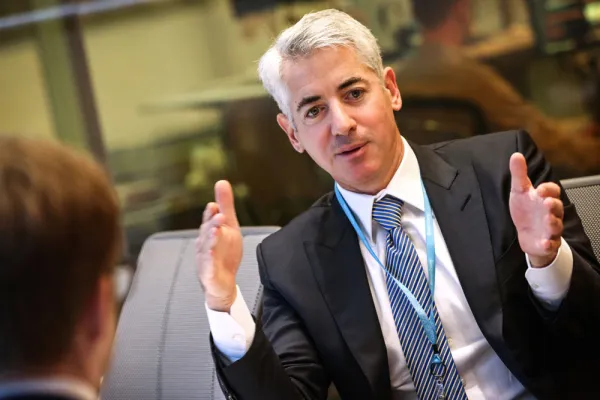Robert L. Johnson has spent much of his career collecting firsts: the first African-American-owned cable television channel, the first black-owned company to list on the New York Stock Exchange, the first African-American billionaire, the first African-American majority owner of a major sports franchise. Now he’s setting his sights on a new superlative: biggest.
As in, the biggest African-American firm in the financial space.
Johnson’s holding company, Bethesda, Md.-based RLJ Companies, has been aggressively expanding its footprint in financial services: RLJ Development, a hotel investment firm, in February inked a deal to buy 100 hotels for $1.7 billion; the 90 Marriott hotels instantly made it one of the largest Marriott franchisees in the U.S. and quadrupled the number of hotels it owns. On March 15, RLJ received regulatory approval for its takeover of an Orlando, Fla.-based savings and loan, Metro Bank. Johnson plans to rechristen it the Urban Trust Bank, and open a downtown Washington, D.C., branch. The bank acquisition is significant not only because it returns the historically minority-owned bank to black owners but also because it gives RLJ a federal bank charter, enabling the firm to quickly expand across the country.
Last year, Johnson took RLJ another step toward building his dreamed-of financial services empire, setting up the private equity fund RLJ Equity Partners, and the fund of hedge funds, RLJ Select Investments. And here, as with his first venture, Black Entertainment Television, Johnson is not going it alone, having signed up p.e. powerhouse The Carlyle Group as a strategic partner and minority owner of the Equity Partners business, and Deutsche Bank’s Deutsche Asset Management in a similar role with the Select Investments business. Johnson plans to be very involved in all aspects of his increasingly disparate enterprises.
“[The ventures] fit together like a five-pointed star,” Johnson tells DailyII.com. “They’ve each got their own place to shine, but they’re connected in the center by me.”
Johnson, 60, is, of course best known for BET, which he founded in 1980 with a $500,000 loan from John Malone, then the head of cable company TCI. Eleven years later, BET became the first black-owned company to list on the NYSE, raising $72 million. Twenty years later, it made Johnson a billionaire when he sold it – after having retaken it private in 1998 – to Viacom for $3 billion. Not bad for the ninth of 10 kids who grew up in Freeport, Ill and, who, by 1972, was studying international affairs at Princeton University.
In spite of his lack of formal investment management experience, BET’s singularly remarkable return on investment -- 6,000% – is one example Johnson uses to convince institutions to invest with RLJ.
“All you’ve got to do is basically buy low and sell high,” Johnson says, tongue firmly in cheek. “I have experience in investing that’s about the same as anybody else who ever invested, except that I’ve proven I can take a half-million dollar loan from John Malone and turn it into a $3 billion business.”
Still, Johnson not getting into this simply to pad his own ample bank account, or build an empty monument to himself – he’s in it to make a sociological point.
“Why in this country don’t we have more African-American management companies involved in managing the wealth of this nation?” he asks. “We are going to try to take away any kind of concern that we can’t find good African-American managers. We’re going to answer that question by saying, ‘If Bob Johnson can find them, why can’t the next guy find them?’ And the answer is, we can.”
The dearth of African-Americans among the old-boy money management networks is pronounced, even as blacks have made strides in other business fields. “In every sector of society, racial prejudice remains, and there’s no reason to think in asset management it’s any different,” says Kenneth Shropshire, who teaches business ethics and legal studies at the University of Pennsylvania’s Wharton School. Daphne Dufresne. Shropshire is one of the new managing directors at RLJ Equity Partners. “It’s not a little-known fact that there are very few African-Americans in private equity or in venture capital, and it’s not for lack of interest.”
Johnson makes plain that he doesn’t only want to build the largest African-American-owned financial services business, he wants to build a successful one. For instance, in the fund of hedge funds, Johnson and his associates say they adopting a colorblind manager selection process. “It’s going to be run by any manager that fits our allocation strategy,” Johnson says. “We’re looking for the best fund managers.”
That stance might strike some as counter to the point that Johnson says he hopes to make. Camille Charles, a sociology professor and faculty associate director of Penn’s Center for Africana Studies, identifies two separate issues: the dearth of black-owned financial services corporations, and the reality that there are few African-Americans in top management in anybody’s financial services company. Johnson’s focus on the first of those issues could raise some eyebrows.
“Certainly, there could be some blacks who are disappointed because he isn’t necessarily trying to hire more employees who are African-American,” Charles notes. “At the same time, it’s not really fair to put the weight of the black community’s woes onto a single individual.”
Johnson argues that the paucity of blacks in asset management is further exacerbated by something of a vicious cycle: institutional investors give their money to managers they know, and they don’t know many African-American managers. African-American money management startups have a hard time finding assets to manage.
“If you’re not part of that flow of connections, you’re not going to get any money,” Johnson argues. “And, if you happen to be African-American, in many cases, there’s a lack of confidence on the part of investors that African-Americans can be good asset managers, because they don’t see very many of them.”
Johnson is clearly not just any African-American money manager. “Bob Johnson’s a guy who’s been successful at virtually everything he’s touched,” Shropshire says, adding that he has accumulated a lot of good will, name recognition, and an awfully thick Rolodex along the way.
“In many cases, African-American businessmen and entrepreneurs don’t have access to people at the top, where they can share their ideas, as I did with John Malone,” Johnson explains. “Because of my success and high profile in business, I’ve gotten to know a number of major executives and business leaders who, when go I go to them with an idea, they’ll buy into it.”
The Carlyle partnership is a case in point. Johnson’s friend from his BET days, William Kennard, who headed the Federal Communications Commission under President Bill Clinton, now works as a managing director at Carlyle. What’s more, Carlyle CEO David Rubenstein and Johnson both serve on the board of trustees of Johns Hopkins University.
Johnson got his entrée with Deustsche Asset Management because, well, he’s a really rich guy, and they wanted him as a client. “The Deutsche Bank people approached us through their private wealth side, wanting to manage my money,” he says. Deutsche didn’t get too far on that count, but in time, the conversations led to the fund of hedge funds.
Among his contacts and through his experiences, Johnson concluded that “many business leaders feel that there is a need and a desire to see more African-American management involved in managing the wealth of this nation.” RLJ is designed to open that avenue, “not by saying, ‘Just give me investment money to act as a fiduciary because I’m African-American,” Johnson says, but, ‘Give it to me because I am very good at what I do,’ and, by the way, you would be achieving a social objective that’s in the best interests of this nation.”
Achieving the primary objective, of course, requires assembling a top-notch team – another area where Johnson’s name, considerable charm and formidable fortune have come in handy. “We find people, particularly young African-Americans, who are a good, solid number three or four, but they’re not number one or two. If they come with me on this venture, they come in the door one or two.”
Daphne Dufresne is one of Johnson’s new number ones, bringing almost a decade of p.e. experience to RLJ Equity Partners. Working first in Europe with the Royal Bank of Scotland, she returned to the U.S. for business school at Harvard University, and then joined the $3.4 billion p.e. firm Weston Presidio as a principal. After six years with Weston, she moved to Parish Capital Advisors. Not long after, she got the call from RLJ.
Having recently joined Parish, Dufresne was initially reluctant. “Team is very important to me, and I had joined a group at Parish which was a very cohesive, great group of individuals.” She eventually decided that, “[RJL was] one of those situations [she] couldn’t say no to.” The RLJ p.e. fund will focus on mid-sized media, entertainment and consumer companies.
“The attraction was the ability to build a firm from the ground floor,” Dufresne says, adding that “the ability to work with a legendary entrepreneur like Bob Johnson” didn’t hurt. Neither did his wallet: Dufresne happily notes that her new firm – she serves as one of two managing directors alongside Alan Nichols, Johnson’s old CFO at BET – is “up and running” already, “one of the benefits of having a partner like Bob [who] has the wherewithal to get things going immediately.”
Johnson acknowledges his unique position. “I do have the capital to attract the talented people and convince them that they’re going to get a paycheck while raising the capital. The risk to me is not that great, because if we just dig a dry hole, I’m still going to be financially comfortable.”
So far, finding those talented African-Americans has not been much of a challenge, according to those charged with hiring them. “People are coming to us,” explains Derek Saleeby, the new executive managing director of RLJ Select Investments, “because we have such a high profile.”
Dufresne sees the same thing at the p.e. fund. “We are getting a disproportionate amount of resumes from people who are minorities or African-Americans, because they see this new firm that has an African-American leader, Bob Johnson, behind it,” she says. She estimates that 40% of her applicant pool are members of minority groups, whereas at her earlier stops, “it was probably less than 1%.”
It is that draw that Charles argues could make the biggest difference for blacks who are interested in a money-management future. “What he may be able to do is to create a pipeline,” she says, adding, “if it’s something that he’s conscious about, then there may be things in place to ensure the kind of mentoring that research suggests minority employees in those kinds of environments don’t always get.”
The “cottage industry” nature of private equity, Dufrense says, means talent often comes from a select number of schools. “A certain profile tends to come up over and over and over again,” she says. “It’s a constant of people hiring people like them. Unfortunately, this is an industry in which African-Americans weren’t involved.”
Saleeby has seen much the same thing in his two decades in financial services. “When I left college and business school, there were very few African Americans in certain areas in investment banking,” especially corporate finance, where he worked for Citibank, Smith Barney, PaineWebber and Spain’s BBVA. When he left investment banking, he founded a p.e. firm and merchant bank, African Private Equity Partners, before joining hedge fund RAM Capital Resources. He found asset management was no different from investment banking in at least one respect: few African-American professionals.
“The asset management space, I suspect, has been even more guarded in that regard,” Saleeby says, “because of the issue of getting comfortable with all the parties that are out there.... The truth is, there have been quite a few successful minority and female managers out there, who have been knocking the cover off the ball. But they were flying low, and bringing in certain select investors, raising assets to a certain critical level, and then calling it a day.”
The sheer visibility of a person like Johnson should prevent RLJ from flying underneath the radar, and not only those of asset managers and the country’s financial elite. “Bob Johnson is someone who seems to me more recognizable to everyday black folks, as opposed to somebody like Alphonse Fletcher,” the head of Fletcher Asset Management, Prof. Charles says. “Historically, there has been something of an issue about getting African-Americans to invest; they might feel more comfortable doing that with a black-owned company.”






